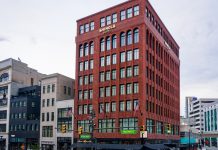Detroit summer is a sun-drenched season of festivals and music. ItтАЩs food trucks, yoga in the grass, and toes in sand at the urban beach. Across all six of DetroitтАЩs downtown parks, which boast a combined 4 million visitors annually, there is something for everyone тАФ even those who prefer a Detroit winter with ice-skating and hot chocolate.
This is no surprise to the Detroit-born Njia Kai of . Kai has spent her career place-making for DetroitтАЩs most iconic downtown parks and directing the cityтАЩs largest festivals. The best part, according to Kai, whoтАЩs just wrapped her 12th year heading the African World Festival, is seeing people enjoy themselves downtown.
тАЬWeтАЩre not in Detroit because we have to be here,тАЭ she says. тАЬWe choose to be here because Detroit is special. The people in Detroit are special.тАЭ
Creating a mise-en-scene is a skill Kai mastered when she switched from prelaw to filmmaking at Howard University. Little did she know that her ability to set a scene and frame people together would change the landscape of how Detroiters gather.
The Cass Technical High School grad enjoyed a burgeoning film career on the East Coast, where she notably served as camerawoman on, a film added to the Library of Congress in 2004 тАФ the same year she began programming events at .
Years before becoming DetroitтАЩs unofficial social director, Kai spotted a classified ad seeking a production coordinator for the Detroit Festival of the Arts and the University Cultural Center Association, the organization that would merge with the New Center Council to become .
Kai spent the next 24 years with the festival, ultimately becoming its director, a role in which she served until she was asked by then-Detroit 300 Conservancy President Robert Gregory to consult on the opening of a new park.
In Swahili, the word for path or road is njiaтАж Justice Augustus Woodward would not have known this as he planned an early Detroit, after the fire of 1805, with Campus Martius at its center.
As the city rose from its ashes, the site became a gathering place and home to the cityтАЩs point-of-origin stake, charting out the mile roads and marking the beginning of the main arteries of Woodward, Michigan, and Gratiot avenues.
More than a century later, through times of civil unrest and a decline in manufacturing industries, Campus Martius shrunk to the size of a traffic island as many residents left the city and warned others about crossing certain mile roads.
Kai, with a genuine love for Detroit, understood the image and assumptions she had to work against and curated events for the kind of city she knew Detroit could be.
David Cowan, the тАШs chief public spaces officer, remembers the early days of the park well.
тАЬWhen Campus Martius Park opened, you saw a change in the perception of downtown because there was now a shining jewel in the center,тАЭ he says.
тАЬWhen thereтАЩs a park in a public space, itтАЩs not about the design тАФ itтАЩs about whoтАЩs using it and for what. ItтАЩs always been a people-forward approach to public space, and Nija is part of the reason why we embodied that early on.тАЭ
This story is part of the 2024 ║┌┴╧═Ї Detroiters package, our annual roundup of╠¤people who make Motown better, more interesting, and more fun. Learn more about our ║┌┴╧═Ї Detroiters╠¤here, and read more stories from the January 2024 issue╠¤here.
|
| ╠¤ |
|








